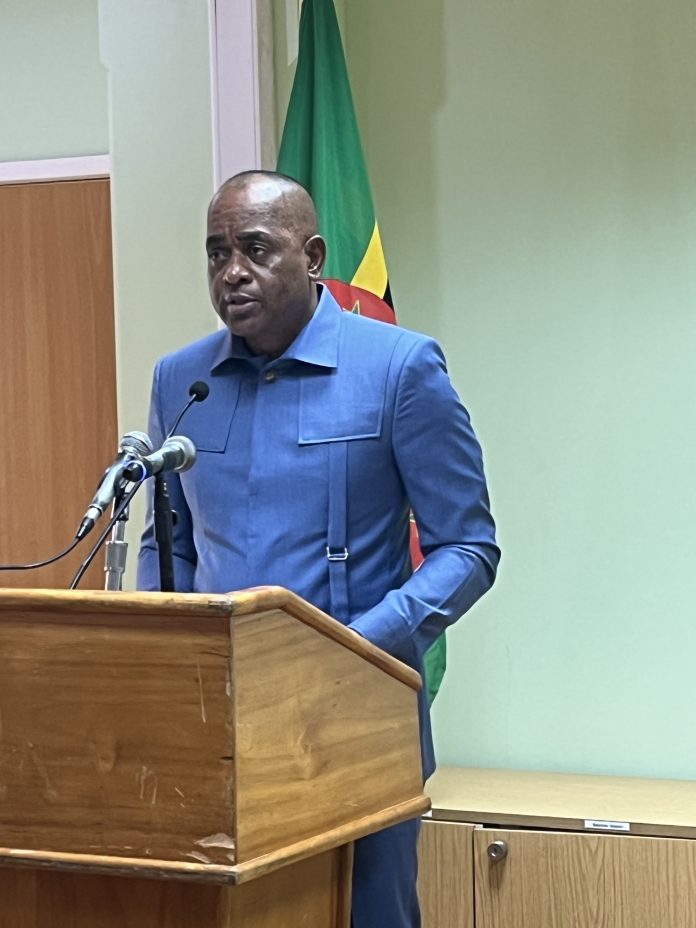
Staff Writer
ROSEAU, Dominica, Nov 13, CMC- Prime Minister Roosevelt Skerrit Thursday said that countries that attended the fourth European Union and the Community of Latin American and Caribbean States ( EU-CELAC) in Colombia earlier this week have reiterated the need for the Caribbean region to remain a zone of peace.
Skerrit, who led his country’s delegation to the meeting in Santa Marta, told a news conference that the leaders from Latin America, the Caribbean, and the European Union had reaffirmed “our commitment to democracy, good governance and the rule of law.
“We further pledged to uphold the principles of the United Nations Charter, sovereign equality, territorial integrity, and the peaceful settlement of disputes.
“CELAC’s declaration of Latin America and the Caribbean as a zone of peace was again endorsed. We recognised the importance of dialogue, cooperation and maritime security, especially for small island states like ours,” he told reporters.
In recent weeks, the United States has been building up a military presence in the region under the pretext of eradicating the illegal drug trade, but political observers say the move is aimed more at regime change in Venezuela, which Washington said is being led by a dictator in Nicolas Maduro.
Washington has sent several warships, including the world’s largest carrier, the USS Gerald R Ford, into the area. The Americans have killed several people, including two Trinidad and Tobago nationals in strikes on what it termed illegal vessels carrying drugs in international waters and Trinidad and Tobago’s Prime Minister Kamla Persad Bissessar, which has dismissed the notion of the region being regarded as a zone of peace, is on record as saying that those in the illegal drug trade should be “killed violently”.
Skerrit said the meeting in Colombia also acknowledged the neutrality of the Panama Canal as essential to global peace, trade, and stability.
“We discussed the growing number of conflicts around the world and expressed deep concern over their humanitarian impact. We agreed that diplomacy, dialogue, and respect for international law must guide our actions.
“On Ukraine, we supported all efforts toward a sustainable ceasefire and a just peace based on sovereignty and territorial integrity. On the situation in Gaza, we welcomed the first phase of the Comprehensive Peace Plan and urged all parties to uphold international humanitarian law and allow the safe delivery of aid,” he added.
Skerrit said he is joining his colleagues in reaffirming support for the people of Haiti and the ongoing efforts to restore security and stability in the French-speaking Caribbean Community (CARICOM) country.
“We also repeated our opposition to the economic and financial embargo imposed on Cuba and called for an end to unilateral measures that affect its development. As you know, Dominica has been consistent on this matter.”
He said that a major focus of the discussions was the need for reform of the international system and agreed that the United Nations must become “more representative, inclusive and democratic, reflecting the realities of today’s world.
“CELAC countries proposed that the next UN Secretary-General should come from our region, and this received strong attention,” Skerrit said, adding that “we also supported reforms to the global financial architecture to make it more just and responsive to the needs of developing nations.
“I stressed that small island developing states like Dominica need greater access to concessional financing and debt relief based on their vulnerabilities and exposure to climate and economic shocks.
“We reaffirmed our commitment to a fair, rules-based multilateral trading system under the World Trade Organization (WTO) and welcomed the strengthening of trade and investment ties between Europe, Latin America, and the Caribbean,” he added.
The Dominican leader said a key outcome for the region was the emphasis on climate resilience and the energy transition.
“We renewed our collective commitment to the goals of the Paris Agreement. I took the opportunity to highlight Dominica’s leadership in building a climate-resilient nation and advancing a clean energy agenda through geothermal development.
“We also discussed regional cooperation to address environmental challenges such as sargassum, turning them into opportunities for innovation, job creation and sustainable growth,” he said, adding “in all, this meeting was a reaffirmation of solidarity between Latin America, the Caribbean and Europe”.
Skerrit also took the opportunity to wish fellow Labour party governments in St. Vincent and the Grenadines and St. Lucia “all the best” in the general elections carded for November 27 and December 1, respectively.
He dismissed the idea of interference in the internal affairs of the two countries, saying that the Dominica Labour Party (DLP), which he leads, has always enjoyed good relations with sister labour parties in the region, and it is in that context that he wishes them success in the elections.
“In the end, it will be left to the people of these countries to choose a government of their choice,” he said, adding that his government would work with whoever emerges victorious in the democratically held polls.
CMC/c/ir/2025

